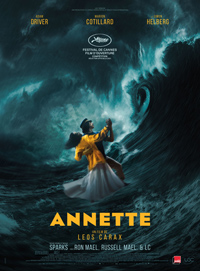Henry Fool: Music & Misogyny Explored in Glossy Return of Carax
 Like nearly all of Leos Carax’s films over the past thirty years (of which there are only five), they all bear a similar stamp, for better or worse, as vessels for cult cineastes. His latest, the long-gestating Annette, is a novelty amongst the director’s own novelties, an English language debut which also happens to be a musical featuring a completely original soundtrack by Sparks, the perennial Ron & Russell Mael (now in the daze of a renaissance thanks to the Edgar Wright doc The Sparks Brothers).
Like nearly all of Leos Carax’s films over the past thirty years (of which there are only five), they all bear a similar stamp, for better or worse, as vessels for cult cineastes. His latest, the long-gestating Annette, is a novelty amongst the director’s own novelties, an English language debut which also happens to be a musical featuring a completely original soundtrack by Sparks, the perennial Ron & Russell Mael (now in the daze of a renaissance thanks to the Edgar Wright doc The Sparks Brothers).
The Los Angeles set tale finds two creative egos finding love in a hopeless place, an opera diva and a misanthropic comedian, who create the titular child who, for various enigmatic reasons, becomes a touring prodigy chanteuse. What’s most strange about Carax this time around, who’s heretofore been making pictures about lovers compromised by circumstance (to put it mildly), is how demure his fantastical narrative plays out. With much of the creative energy usurped by the required singing, there’s little room for emotional engagement, but some strident choices make for an altogether memorable experience which will likely take years to amass a cache of appreciation for its idiosyncrasies.
Henry (Adam Driver) is a popular Los Angeles comedian with a long running show called “The Ape of God.” While he purposely provokes people as he roams the stage like a wild animal, just down the street at the Disney Concert Hall is opera singer Ann (Marion Cotillard). The two celebrities have fallen in love, and shortly thereafter, Ann gives birth to their child, Annette. As their daughter grows, Henry’s star begins to wane and he turns to alcohol. A tragedy leads to the discovery of a unique gift of Annette’s, and Henry chooses to exploit his child by touring the world, lassoing Ann’s accompanist cum conductor (Simon Helberg) in his devious schemes which eventually spin out of control.
For fans of Sparks, or those recently familiarized with them, it’s really only the opening number, the self-reflexive “Can We Start?,” to whet any particular appetite for their catalogue. Annette, in both song and dialogue, is an endless ferris wheel of repetition. Snips of songs are merely repeated phrases, which sometimes have the tendency to grate. Initially, the novel idea works spectacularly, such as the lovers professing their endless love on the back of motorcycle (a favored Carax theme, and a limousine sequence makes an early appearance, a la Holy Motors), considering the throb of initial desire is complete, infectious refrain (yielding the film’s most erotic moment). Even the character names are repetitive, from Henry McHenry, to Ann vs. Annette, and even the repeated use of an entertainment reporter (assumedly cheaply administered on purpose, Connie O’Connor).
Visual motifs abound, with Ann often chomping on an apple, and Henry his bananas (for his Eugene O’Neill inspired routine), but it suggests the key to some implicit meanings behind Annette regarding female subjugation, going back to Adam and Eve. Ann has a Me Too inspired dream sequence, wherein six women come forward stating Henry sexually assaulted or abused them.
Based on what happens between Ann and Henry catapulting the film into its third act, Carax and Sparks seem to be authoring a treatise on the constant exploitation of women at the hands of their partners, whether coerced or consensual. However, Annette plays like a piece of odd pop, somewhere in a strange intersection of Carax and Sparks.
The opening song and final duet between Driver and Devyn McDowell conjures the energy most of the film simply cannot, leaving the Mael Bros. feeling somewhat underutilized. Cotillard, despite her impressive vocal range, also feels like a cipher in a film in which all elements take a complete back seat to Annette being presented as a creepy doll (although this works as a metaphor on how children are treated as such until they display their own unique personalities). In its third act, Annette feels like Sia riffing on The Dark Crystal, and by its final frames presents a rare case for the kind of divisive cinema which will either be celebrated or dismissed. Kooky in its own strange, quiet way, for all its sinister happenings, Annette is the most hopeful film from Carax to date.
Reviewed on July 6th at the 2021 Cannes Film Festival – Competition – Opening Night Film. 139 Mins
★★★/☆☆☆☆☆


